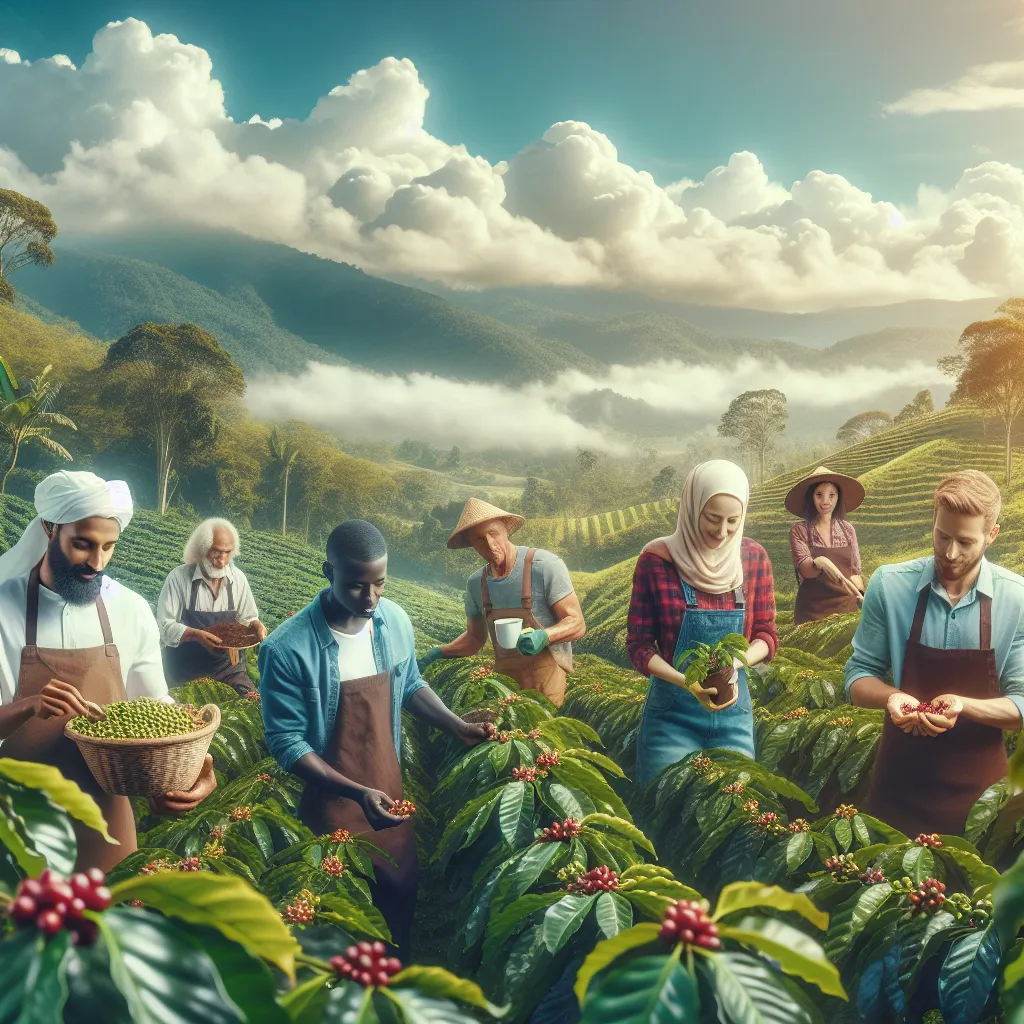The Impact of Sustainable Farming on Coffee Industry
Exploring the sustainable practices in the coffee industry is essential for understanding the impact of sustainable farming on the coffee sector. Sustainable farming encompasses a range of practices aimed at preserving the environment, supporting local communities, and ensuring the long-term viability of coffee production. This approach involves initiatives such as organic farming, agroforestry, biodiversity conservation, and fair trade practices.
Sustainable farming plays a crucial role in the coffee industry by promoting environmental stewardship. By eschewing chemical pesticides and fertilizers, sustainable coffee farming helps to protect the surrounding ecosystem, including soil health and water quality. Furthermore, the use of shade-grown coffee promotes biodiversity by providing habitat for a variety of plant and animal species.
Moreover, sustainable farming practices have a direct impact on the quality of coffee. By prioritizing soil health and natural cultivation methods, sustainable farms often produce higher quality beans with distinct flavors. This, in turn, leads to a more sustainable economic model for coffee farmers, as they can command higher prices for their premium, sustainably-grown coffee.
Additionally, the emphasis on fair trade and ethical working conditions within sustainable coffee farming positively impacts the lives of coffee workers and their communities. By ensuring fair wages and safe working conditions, sustainable farming supports social development and empowers local coffee-growing communities.
In conclusion, the impact of sustainable farming on the coffee industry is far-reaching, encompassing environmental, economic, and social dimensions. By adopting sustainable practices, the coffee sector can contribute to a more sustainable and ethical global supply chain, while also producing higher quality coffee for consumers who are increasingly mindful of the origins and cultivation methods behind their favorite brew.
Strategies for Implementing Ethical Sourcing in the Coffee Supply Chain
Implementing ethical sourcing strategies is crucial for promoting sustainability in the coffee supply chain. Ethical sourcing involves ensuring that the coffee beans are produced and traded in a way that is environmentally friendly, socially responsible, and economically viable for all stakeholders involved. One of the key strategies for implementing ethical sourcing in the coffee industry is to build direct relationships with coffee farmers and cooperatives.
This approach allows coffee companies to have greater visibility and control over the production process, ensuring that fair prices are paid to the farmers and that the environmental impact is minimized. By establishing direct relationships, coffee companies can also provide support and resources to help farmers improve their agricultural practices, leading to higher quality beans and increased yields.
Another important strategy is the certification of coffee beans through programs such as Fair Trade, Rainforest Alliance, or Organic certifications. These certifications provide consumers with the assurance that the coffee they are purchasing has been produced in a way that aligns with ethical and sustainable standards. By obtaining these certifications, coffee companies can differentiate their products in the market and attract consumers who are increasingly conscious of the ethical and environmental impact of their purchasing decisions.
Furthermore, investing in community development projects in coffee-growing regions is a strategy that can have a positive impact on the social aspect of ethical sourcing. By supporting education, healthcare, and infrastructure development in these communities, coffee companies contribute to improving the overall well-being of the farmers and their families, creating a more sustainable and ethical supply chain.
In conclusion, the implementation of ethical sourcing strategies in the coffee industry is essential for promoting sustainability and social responsibility. By building direct relationships with farmers, obtaining relevant certifications, and investing in community development, coffee companies can play a significant role in creating a more ethical and sustainable coffee supply chain.
Environmental Benefits of Shade-Grown Coffee
Shade-grown coffee, also known as forest-grown or agroforestry coffee, has gained considerable attention in the coffee industry due to its environmental benefits. Unlike sun-grown coffee, which is often associated with deforestation and habitat destruction, shade-grown coffee is cultivated under a canopy of diverse tree species. This sustainable practice not only preserves the natural ecosystem but also offers a myriad of environmental advantages.
One of the key environmental benefits of shade-grown coffee is its positive impact on biodiversity. The shade trees provide a natural habitat for a variety of plant and animal species, promoting ecological diversity. This, in turn, helps to maintain the balance of local ecosystems and preserves endangered flora and fauna.
Furthermore, the canopy of trees in shade-grown coffee plantations acts as a carbon sink, absorbing carbon dioxide from the atmosphere and mitigating the effects of climate change. The presence of diverse vegetation also contributes to soil conservation and prevents erosion, thus preserving the integrity of the surrounding land.
Additionally, shade-grown coffee farms reduce the reliance on chemical inputs, as the rich biodiversity creates a natural pest control system. This minimizes the need for synthetic pesticides and fertilizers that can have detrimental effects on the environment and surrounding water sources.
In conclusion, the shift towards shade-grown coffee represents a proactive step in promoting environmentally sustainable practices within the coffee industry. By preserving biodiversity, sequestering carbon, and minimizing the use of harmful chemicals, shade-grown coffee is not only beneficial for the environment but also produces high-quality, flavorful beans, making it a desirable choice for environmentally conscious consumers.
Community Initiatives and Fair Wages in Coffee Production
The sustainable practices in the coffee industry have gained significant attention in recent years, with a growing focus on community initiatives and fair wages in coffee production. Coffee-producing communities have been at the forefront of initiatives aimed at improving the living and working conditions of farmers and workers involved in the coffee supply chain. Fair trade programs have played a crucial role in ensuring that coffee growers receive fair compensation for their products, thereby contributing to the economic development of the communities.
Community initiatives in the coffee industry often involve collaboration between coffee companies, non-governmental organizations, and local community leaders to implement projects that benefit the community as a whole. These initiatives may include building schools, healthcare facilities, and infrastructure improvements, as well as providing training and support to enhance the skills and knowledge of the local workforce.
Furthermore, fair wages are a fundamental aspect of sustainable practices in coffee production. Paying fair wages to coffee farmers and workers not only improves their standard of living but also contributes to the overall economic stability of the community. Fair wages enable workers to provide for their families, access education, and healthcare, and invest in sustainable farming practices, thus creating a positive cycle of development within the community.
In conclusion, community initiatives and fair wages are essential components of sustainable practices in the coffee industry. By prioritizing these aspects, coffee companies and consumers can positively impact the livelihoods of coffee-producing communities, ensuring a more equitable and sustainable coffee supply chain.

